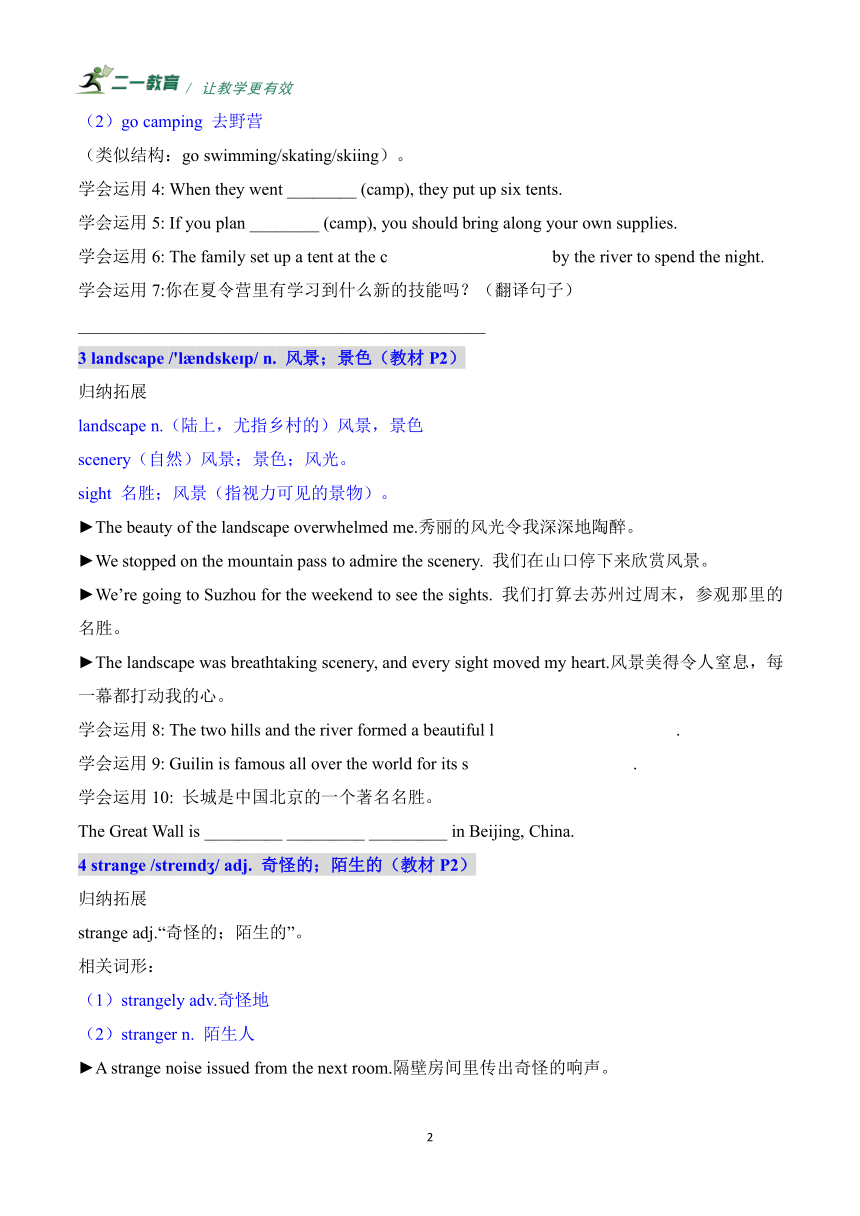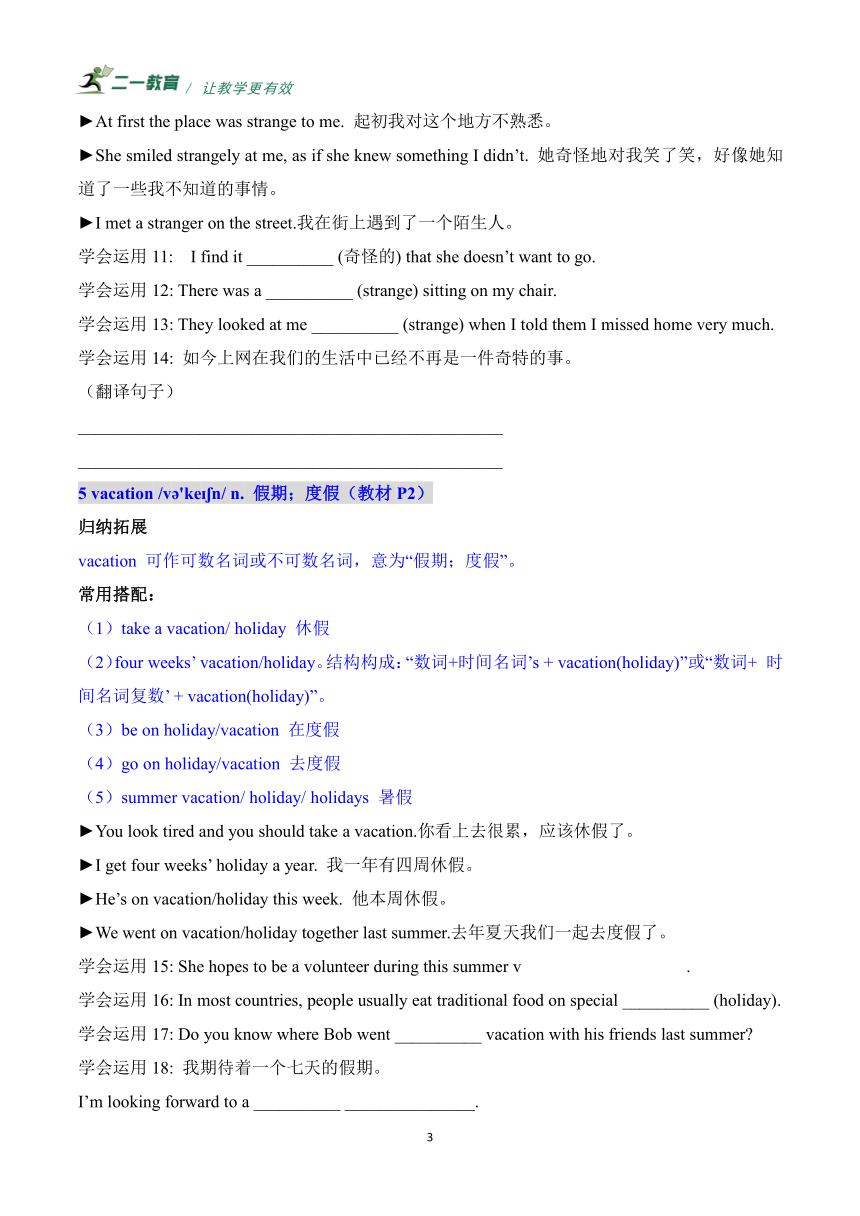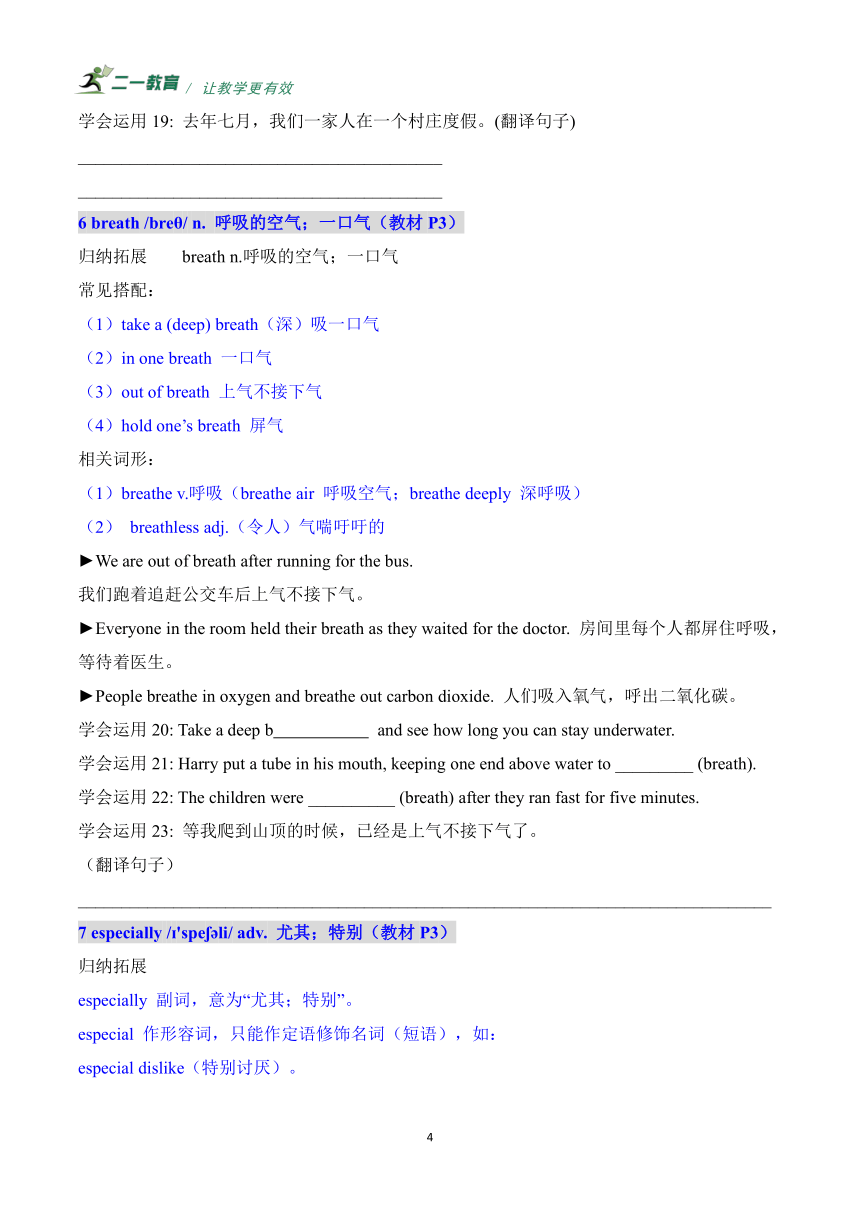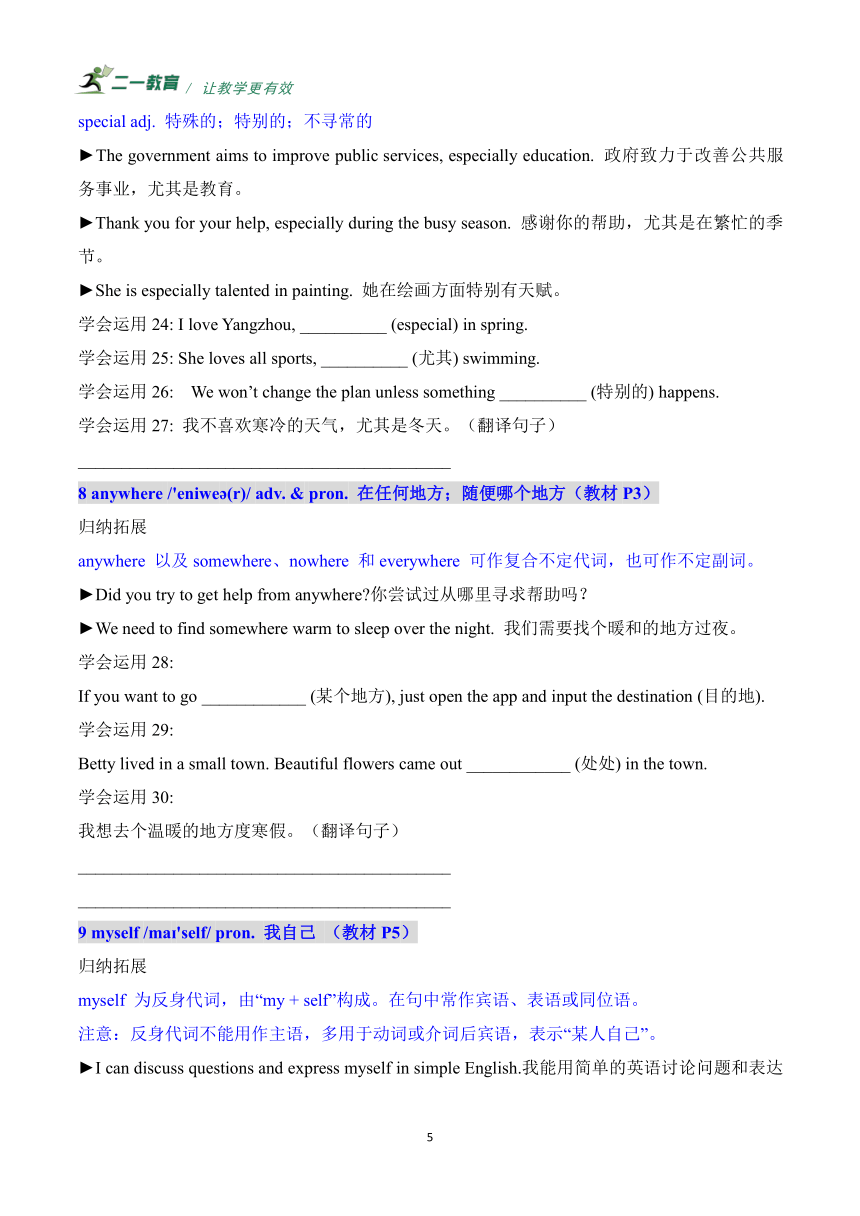2025人教版英语八年级上册 Unit 1 Happy holiday Section A 单词短语知识点详解(学案)
文档属性
| 名称 | 2025人教版英语八年级上册 Unit 1 Happy holiday Section A 单词短语知识点详解(学案) |  | |
| 格式 | docx | ||
| 文件大小 | 272.6KB | ||
| 资源类型 | 试卷 | ||
| 版本资源 | 人教版 | ||
| 科目 | 英语 | ||
| 更新时间 | 2025-05-27 11:43:49 | ||
图片预览





文档简介
/ 让教学更有效
Unit 1 Happy holiday
Section A 单词短语知识详解
1 ancient /'e n nt/ adj. 古代的;古老的(教材P2)
ancient 作形容词,表示“古代的;古老的”。
归纳拓展常见用法:
(1)in ancient times 在古代;古时候。times 表示“时代”。
(2)an ancient story 一个古老的故事。ancient 修饰可数名词单数时,前面不定冠词要用an,因为ancient 以元音音素开头。
(3)the ancients 古人。
In ancient times, the people of Yongzhou liked to live by the river. They were all very good at swimming. 古时候,永州的人喜欢住在河边。他们都很擅长游泳。
Love is an ancient story yet it is ever new.
爱是一个古老的故事,但它却是万古常新。
The ancients in China in the Classics didn’t believe people today can travel thousands of miles in one day.《典籍里的中国》中的古人不相信今天的人们能够日行千里。
This building is ancient. 这座建筑是古老的。
学会运用1: Celebrating the Spring Festival is __________ ancient Chinese tradition.
学会运用2: Brandon loves learning about the lifestyle of __________(古代的) Chinese people.
学会运用3: 这座博物馆收藏了来自不同文化的古代艺术作品。
The museum has a collection of ____________ __________ __________ from different cultures.
2 camp /k mp/ n. 度假营;营地 v. 露营;宿营(教材P2)
归纳拓展
camp 作名词,意为“度假营;营地”,相关短语:
(1)at the summer camp 在夏令营;
(2)at the camp 在营地。
camp 作动词,意为“露营;宿营”,常用短语:
(1)camp out 露营;露宿;
(2)go camping 去野营
(类似结构:go swimming/skating/skiing)。
学会运用4: When they went ________ (camp), they put up six tents.
学会运用5: If you plan ________ (camp), you should bring along your own supplies.
学会运用6: The family set up a tent at the c by the river to spend the night.
学会运用7:你在夏令营里有学习到什么新的技能吗?(翻译句子)
_______________________________________________
3 landscape /'l ndske p/ n. 风景;景色(教材P2)
归纳拓展
landscape n.(陆上,尤指乡村的)风景,景色
scenery(自然)风景;景色;风光。
sight 名胜;风景(指视力可见的景物)。
The beauty of the landscape overwhelmed me.秀丽的风光令我深深地陶醉。
We stopped on the mountain pass to admire the scenery. 我们在山口停下来欣赏风景。
We’re going to Suzhou for the weekend to see the sights. 我们打算去苏州过周末,参观那里的名胜。
The landscape was breathtaking scenery, and every sight moved my heart.风景美得令人窒息,每一幕都打动我的心。
学会运用8: The two hills and the river formed a beautiful l .
学会运用9: Guilin is famous all over the world for its s .
学会运用10: 长城是中国北京的一个著名名胜。
The Great Wall is _________ _________ _________ in Beijing, China.
4 strange /stre nd / adj. 奇怪的;陌生的(教材P2)
归纳拓展
strange adj.“奇怪的;陌生的”。
相关词形:
(1)strangely adv.奇怪地
(2)stranger n. 陌生人
A strange noise issued from the next room.隔壁房间里传出奇怪的响声。
At first the place was strange to me. 起初我对这个地方不熟悉。
She smiled strangely at me, as if she knew something I didn’t. 她奇怪地对我笑了笑,好像她知道了一些我不知道的事情。
I met a stranger on the street.我在街上遇到了一个陌生人。
学会运用11: I find it __________ (奇怪的) that she doesn’t want to go.
学会运用12: There was a __________ (strange) sitting on my chair.
学会运用13: They looked at me __________ (strange) when I told them I missed home very much.
学会运用14: 如今上网在我们的生活中已经不再是一件奇特的事。
(翻译句子)
_________________________________________________
_________________________________________________
5 vacation /v 'ke n/ n. 假期;度假(教材P2)
归纳拓展
vacation 可作可数名词或不可数名词,意为“假期;度假”。
常用搭配:
(1)take a vacation/ holiday 休假
(2)four weeks’ vacation/holiday。结构构成:“数词+时间名词’s + vacation(holiday)”或“数词+ 时间名词复数’ + vacation(holiday)”。
(3)be on holiday/vacation 在度假
(4)go on holiday/vacation 去度假
(5)summer vacation/ holiday/ holidays 暑假
You look tired and you should take a vacation.你看上去很累,应该休假了。
I get four weeks’ holiday a year. 我一年有四周休假。
He’s on vacation/holiday this week. 他本周休假。
We went on vacation/holiday together last summer.去年夏天我们一起去度假了。
学会运用15: She hopes to be a volunteer during this summer v .
学会运用16: In most countries, people usually eat traditional food on special __________ (holiday).
学会运用17: Do you know where Bob went __________ vacation with his friends last summer
学会运用18: 我期待着一个七天的假期。
I’m looking forward to a __________ _______________.
学会运用19: 去年七月,我们一家人在一个村庄度假。(翻译句子)
__________________________________________
__________________________________________
6 breath /breθ/ n. 呼吸的空气;一口气(教材P3)
归纳拓展 breath n.呼吸的空气;一口气
常见搭配:
(1)take a (deep) breath(深)吸一口气
(2)in one breath 一口气
(3)out of breath 上气不接下气
(4)hold one’s breath 屏气
相关词形:
(1)breathe v.呼吸(breathe air 呼吸空气;breathe deeply 深呼吸)
(2) breathless adj.(令人)气喘吁吁的
We are out of breath after running for the bus.
我们跑着追赶公交车后上气不接下气。
Everyone in the room held their breath as they waited for the doctor. 房间里每个人都屏住呼吸,等待着医生。
People breathe in oxygen and breathe out carbon dioxide. 人们吸入氧气,呼出二氧化碳。
学会运用20: Take a deep b and see how long you can stay underwater.
学会运用21: Harry put a tube in his mouth, keeping one end above water to _________ (breath).
学会运用22: The children were __________ (breath) after they ran fast for five minutes.
学会运用23: 等我爬到山顶的时候,已经是上气不接下气了。
(翻译句子)
________________________________________________________________________________
7 especially / 'spe li/ adv. 尤其;特别(教材P3)
归纳拓展
especially 副词,意为“尤其;特别”。
especial 作形容词,只能作定语修饰名词(短语),如:
especial dislike(特别讨厌)。
special adj. 特殊的;特别的;不寻常的
The government aims to improve public services, especially education. 政府致力于改善公共服务事业,尤其是教育。
Thank you for your help, especially during the busy season. 感谢你的帮助,尤其是在繁忙的季节。
She is especially talented in painting. 她在绘画方面特别有天赋。
学会运用24: I love Yangzhou, __________ (especial) in spring.
学会运用25: She loves all sports, __________ (尤其) swimming.
学会运用26: We won’t change the plan unless something __________ (特别的) happens.
学会运用27: 我不喜欢寒冷的天气,尤其是冬天。(翻译句子)
___________________________________________
8 anywhere /'eniwe (r)/ adv. & pron. 在任何地方;随便哪个地方(教材P3)
归纳拓展
anywhere 以及somewhere、nowhere 和everywhere 可作复合不定代词,也可作不定副词。
Did you try to get help from anywhere 你尝试过从哪里寻求帮助吗?
We need to find somewhere warm to sleep over the night. 我们需要找个暖和的地方过夜。
学会运用28:
If you want to go ____________ (某个地方), just open the app and input the destination (目的地).
学会运用29:
Betty lived in a small town. Beautiful flowers came out ____________ (处处) in the town.
学会运用30:
我想去个温暖的地方度寒假。(翻译句子)
___________________________________________
___________________________________________
9 myself /ma 'self/ pron. 我自己 (教材P5)
归纳拓展
myself 为反身代词,由“my + self”构成。在句中常作宾语、表语或同位语。
注意:反身代词不能用作主语,多用于动词或介词后宾语,表示“某人自己”。
I can discuss questions and express myself in simple English.我能用简单的英语讨论问题和表达自己。
Every time I meet difficulties, I always say to myself, “Yes, I can!”每次我遇到困难时,我总是对自己说:“是的,我能行!”
-You play basketball so well. Who taught you 你篮球打得真好。谁教你的呀?
-Nobody. I learnt it by myself. 没人教。我是自学的。
学会运用31:
-When ______ parents went away on business, I looked after ______.
A. my; myself B. my; mine
C. me; myself D. me; mine
学会运用32:
I designed the dress and made it all by __________ as well. (me)
学会运用33:
我不想成为其他任何人,我只想做我自己。
I don’t want to be __________________ else. I just want to be ___________.
10 comfortable /'k mft bl/ adj. 使人舒服的;舒适的(教材P5)
归纳拓展
comfortable 作形容词,既可作表语也可作定语,意为“使人舒服的;舒适的”。
如:feel comfortable 感到舒适;a comfortable sofa 一张舒服的沙发。
相关词形:
(1)comfortably adv. 舒服地。如:sit/lie comfortably 舒服地坐着/ 躺着。
归纳拓展
uncomfortable adj. 使人不舒服的。comfortable的反义词。
comfort n. 舒适;安逸。如:live in comfort 过得很舒坦;comfort zone 舒适区;give/offer/provide comfort 给予/提供舒适感(或安慰)。
(4)comfort v.安慰,后接宾语。如:comfort sb. 安慰某人。
I feel comfortable in my new clothes.我穿新衣服感觉很舒服。
She sat comfortably in the armchair. 她舒适地坐在扶手椅上。
The hard bed is uncomfortable to lie on. 这张硬板床躺上去不舒服。
They had enough money to live in comfort in their old age. 他们有足够的钱舒舒服服地安度晚年。
I wanted to comfort her, but couldn’t find proper words. 我想安慰她,但又找不出合适的话语。
学会运用34: The Greens live in a warm ___________________ (comfort) house.
学会运用35: I slept ______________ (comfortable) for an hour in the sun.
学会运用36: I felt _______________ (comfortable) after eating too much ice cream in the evening.
学会运用37: 妈妈把南希搂进怀里,尽力安慰她。(翻译句子)
________________________________________________
11 bored /b d/ adj. 厌倦的;烦闷的(教材P5)
归纳拓展
bored adj. 厌倦的;烦闷的
常用搭配:
(1)get/ be/ look bored 感到/看上去无聊
(2)be bored with/of 对……感到厌倦
相关词形:(1)boring adj. 令人厌倦的
(2)bore v. 使厌烦 bore sb. 使某人厌烦/厌倦
辨析: bored 与boring
bored 描述人的感受 e.g. I am bored with this movie. 我对这部电影感到厌倦。
boring 描述事物的特性 e.g. This movie is boring. 这部电影很无聊。
一语辨异
The movie was boring at the beginning, but by the end, even the bored audience was cheering. 电影一开始很无聊,但到最后,连原本感到厌烦的观众都在欢呼。
He gets bored easily. 他很容易感到无聊。
I am bored with this book. 我对这本书感到厌倦。
She is bored of this job. 她对这份工作感到厌烦。
She was good at physics although she thought it boring.尽管她认为物理枯燥无味,她却很擅长。
The meaningless speech bored everyone present.这个无意义的演讲使在场的每个人都厌烦。
学会运用38: There were several young people sitting around, looking __________ (无聊的).
学会运用39: She found her job very __________ (bore).
学会运用40: I don’t want __________ (bore) you with the housework.
学会运用41: 孩子们在屋子里很快就待不住了。(翻译句子)
______________________________________________
12 towards /t 'w dz; t rdz/ (=toward) prep. 向;朝(教材P5)
归纳拓展
towards 向;朝;接近,常用来表示动作的方向、时间上的接近或是对某事物的态度倾向。具体用法:
(1)towards 表示动作的方向。
drive/walk/run towards... 朝……行驶/行走/跑
(2)towards 表示态度或情感的倾向。
show interest/ love/ hate towards... 表现出对……的兴趣/ 热爱/ 憎恨
归纳拓展
(3)towards 表示接近目的或目标。
work towards (doing) sth. 朝着……努力
(4) towards 表示时间的接近。
towards evening/ the end/ midnight 快到晚上/ 结束/ 半夜的时候
The car drove towards the city center. 汽车朝市中心开去了。
He showed great interest towards the new project.他对新项目表现出了极大的兴趣。
We are working towards improving our English skills.我们正在努力提高我们的英语技能。
Towards evening, the sky began to darken. 接近傍晚时,天空开始变暗。
The project’s budget is getting towards the limit.项目的预算正接近限额。
学会运用42: He got out of the car and walked ___________ (朝向) the house.
学会运用43:
Suddenly, I saw something gray moving along the top of the bush ___________ /t 'w dz/ my house.
学会运用44: Marco 和Kim离开学校,朝家走去。(翻译句子)
_________________________________________________________________________________
学会运用45: 这房子在年底以前可以建好(翻译句子)
_________________________________________________________________________________
1、nothing but 只有;只是
归纳拓展
nothing but +名词/ 代词,意为“只有……;除……之外,什么也没有”。
do nothing but do sth. / have nothing to do but do sth.,与动词do 搭配,表示“除……外,什么也不做;只做……”,nothing but 后跟动词原形。
want / hope nothing but to do sth. 与动词不定式连用,表示“只想要/ 希望做某事”。
enjoy/mind nothing but doing sth. 与动名词连用,表示“只喜欢/ 介意做某事”。
学会运用1: The whole story is nothing _________ a pack of lies.
学会运用2: I have n but praise for you all.
学会运用3: We could do nothing but _________ (stand) in cold wind helplessly.
学会运用4: 简无事可干,只是在家里看书。(翻译句子)
__________________________________________
2 ready to do sth. 马上要(做某事);愿意做(某事)
归纳拓展
ready to do sth. 意为“马上要(做某事)”,“愿
意做(某事)”。
get ready to do sth. 意为“准备好做某事”。
类似的表达还有:
be prepared to do sth. 准备好/ 愿意做某事
get prepared to do sth. 准备好做某事
be willing to do sth. 愿意做某事
学会运用5: Are you r to answer my questions Listen to the first question, please.
学会运用6: I’m not ready _________ (start) anything new.
学会运用7: The neighbours are always _________ (will) to lend a hand.
学会运用8: 动物园正准备为大熊猫提供一个更大、更舒适的生活环境。(翻译句子)
______________________________________________________________
1、How was your summer holiday, … 你的暑假怎么样,……?(教材P4)
(分析结构) 此句是特殊疑问句。How 是特殊疑问词,was 是系动词,your summer holiday 是主语。
How was your first day at the new school 你在新学校的第一天过得如何?
How was the movie you watched last night 你昨晚看的电影怎么样?
How was your new colleague I heard he just joined last week. 你新同事怎么样?我听说他上周刚入职。
归纳拓展
“How was... ”相当于“What was... like ”,可用于以下情况:
用于询问某人对过去某件事或经历的感受或印象。
用于询问对某物的印象。
用于询问对某人的印象。
学会运用
1、-Dale, _______ was your school trip
-Great! I had fun there.
A. how B. when C. why D. what
学会运用2: 你的周末如何?(翻译句子)
_________________________________________________________________________________2 When I got to the town, it started raining heavily. 当我到达小镇时,开始下起了大雨。(教材P5)
本句为主从复合句,When 引导时间状语从句,表示主句内容所发生的时间。主句it started raining heavily 为“主谓宾”结构,it 为主语,指天气;started 为谓语;raining heavily 为动名词短语作宾语。从句也是 “主谓”结构,主语是I,谓语是got。
I loved history when I was at school. 我上学时喜欢历史。
When I got home, I found my dog sleeping on the sofa.当我到家时,我发现我的狗正在沙发上睡觉。
when 引导的从句
时间 状语 从句 在句中充当时间状语的从句。 e.g. When she came into my room, I was just reading a book. 她进我房间时,我正在看书。
宾语 从句 在句中充当 宾语的从句。 e.g. He asked me when I could finish my homework. 他问我什么时候能完成我的家庭作业。
表语 从句 在句中充当 表语的从句。 e.g. The problem is when we can start the project. 问题是我们什么时候可以开始这个项目。
学会运用3: Don’t say angry words __________ (当……的时候) you are very angry.
学会运用4: I felt proud w I saw our national flag rising with the rising sun.
学会运用5: 我喜欢画画,我长大后想成为一名艺术家。(翻译句子)
__________________________________________________________
3 There was a beautiful double rainbow in the sky. 天空中有一道美丽的双彩虹。(教材P5)
“There be + 名词”是一个表示存在的固定结构。 There are 表示“有”,其中be 动词的形式由后面离它最近的名词的单复数决定,这里a beautiful double rainbow是单数,且此句时态是一般过去时,所以用was。
There are two books and a pen on the desk.桌子上有两本书和一支钢笔。
There might be a party tonight. 今晚可能有个聚会。
归纳拓展
There be 句型遵循“就近原则”,即 be 动词的形式由离它最近的名词的单复数决定。
There be 句型可以与情态动词连用,表示推测。
学会运用7:
There ________ a lot of people at the concert last night.
A. is B. are C. was D. were
学会运用8: There _________ (be) a beautiful park near my house.
学会运用9: 张家口有一个著名的滑雪胜地。
_________ _________ a famous ski resort in Zhangjiakou.
Unit 1 Happy holiday
Section A 单词短语知识详解
1 ancient /'e n nt/ adj. 古代的;古老的(教材P2)
ancient 作形容词,表示“古代的;古老的”。
归纳拓展常见用法:
(1)in ancient times 在古代;古时候。times 表示“时代”。
(2)an ancient story 一个古老的故事。ancient 修饰可数名词单数时,前面不定冠词要用an,因为ancient 以元音音素开头。
(3)the ancients 古人。
In ancient times, the people of Yongzhou liked to live by the river. They were all very good at swimming. 古时候,永州的人喜欢住在河边。他们都很擅长游泳。
Love is an ancient story yet it is ever new.
爱是一个古老的故事,但它却是万古常新。
The ancients in China in the Classics didn’t believe people today can travel thousands of miles in one day.《典籍里的中国》中的古人不相信今天的人们能够日行千里。
This building is ancient. 这座建筑是古老的。
学会运用1: Celebrating the Spring Festival is __________ ancient Chinese tradition.
学会运用2: Brandon loves learning about the lifestyle of __________(古代的) Chinese people.
学会运用3: 这座博物馆收藏了来自不同文化的古代艺术作品。
The museum has a collection of ____________ __________ __________ from different cultures.
2 camp /k mp/ n. 度假营;营地 v. 露营;宿营(教材P2)
归纳拓展
camp 作名词,意为“度假营;营地”,相关短语:
(1)at the summer camp 在夏令营;
(2)at the camp 在营地。
camp 作动词,意为“露营;宿营”,常用短语:
(1)camp out 露营;露宿;
(2)go camping 去野营
(类似结构:go swimming/skating/skiing)。
学会运用4: When they went ________ (camp), they put up six tents.
学会运用5: If you plan ________ (camp), you should bring along your own supplies.
学会运用6: The family set up a tent at the c by the river to spend the night.
学会运用7:你在夏令营里有学习到什么新的技能吗?(翻译句子)
_______________________________________________
3 landscape /'l ndske p/ n. 风景;景色(教材P2)
归纳拓展
landscape n.(陆上,尤指乡村的)风景,景色
scenery(自然)风景;景色;风光。
sight 名胜;风景(指视力可见的景物)。
The beauty of the landscape overwhelmed me.秀丽的风光令我深深地陶醉。
We stopped on the mountain pass to admire the scenery. 我们在山口停下来欣赏风景。
We’re going to Suzhou for the weekend to see the sights. 我们打算去苏州过周末,参观那里的名胜。
The landscape was breathtaking scenery, and every sight moved my heart.风景美得令人窒息,每一幕都打动我的心。
学会运用8: The two hills and the river formed a beautiful l .
学会运用9: Guilin is famous all over the world for its s .
学会运用10: 长城是中国北京的一个著名名胜。
The Great Wall is _________ _________ _________ in Beijing, China.
4 strange /stre nd / adj. 奇怪的;陌生的(教材P2)
归纳拓展
strange adj.“奇怪的;陌生的”。
相关词形:
(1)strangely adv.奇怪地
(2)stranger n. 陌生人
A strange noise issued from the next room.隔壁房间里传出奇怪的响声。
At first the place was strange to me. 起初我对这个地方不熟悉。
She smiled strangely at me, as if she knew something I didn’t. 她奇怪地对我笑了笑,好像她知道了一些我不知道的事情。
I met a stranger on the street.我在街上遇到了一个陌生人。
学会运用11: I find it __________ (奇怪的) that she doesn’t want to go.
学会运用12: There was a __________ (strange) sitting on my chair.
学会运用13: They looked at me __________ (strange) when I told them I missed home very much.
学会运用14: 如今上网在我们的生活中已经不再是一件奇特的事。
(翻译句子)
_________________________________________________
_________________________________________________
5 vacation /v 'ke n/ n. 假期;度假(教材P2)
归纳拓展
vacation 可作可数名词或不可数名词,意为“假期;度假”。
常用搭配:
(1)take a vacation/ holiday 休假
(2)four weeks’ vacation/holiday。结构构成:“数词+时间名词’s + vacation(holiday)”或“数词+ 时间名词复数’ + vacation(holiday)”。
(3)be on holiday/vacation 在度假
(4)go on holiday/vacation 去度假
(5)summer vacation/ holiday/ holidays 暑假
You look tired and you should take a vacation.你看上去很累,应该休假了。
I get four weeks’ holiday a year. 我一年有四周休假。
He’s on vacation/holiday this week. 他本周休假。
We went on vacation/holiday together last summer.去年夏天我们一起去度假了。
学会运用15: She hopes to be a volunteer during this summer v .
学会运用16: In most countries, people usually eat traditional food on special __________ (holiday).
学会运用17: Do you know where Bob went __________ vacation with his friends last summer
学会运用18: 我期待着一个七天的假期。
I’m looking forward to a __________ _______________.
学会运用19: 去年七月,我们一家人在一个村庄度假。(翻译句子)
__________________________________________
__________________________________________
6 breath /breθ/ n. 呼吸的空气;一口气(教材P3)
归纳拓展 breath n.呼吸的空气;一口气
常见搭配:
(1)take a (deep) breath(深)吸一口气
(2)in one breath 一口气
(3)out of breath 上气不接下气
(4)hold one’s breath 屏气
相关词形:
(1)breathe v.呼吸(breathe air 呼吸空气;breathe deeply 深呼吸)
(2) breathless adj.(令人)气喘吁吁的
We are out of breath after running for the bus.
我们跑着追赶公交车后上气不接下气。
Everyone in the room held their breath as they waited for the doctor. 房间里每个人都屏住呼吸,等待着医生。
People breathe in oxygen and breathe out carbon dioxide. 人们吸入氧气,呼出二氧化碳。
学会运用20: Take a deep b and see how long you can stay underwater.
学会运用21: Harry put a tube in his mouth, keeping one end above water to _________ (breath).
学会运用22: The children were __________ (breath) after they ran fast for five minutes.
学会运用23: 等我爬到山顶的时候,已经是上气不接下气了。
(翻译句子)
________________________________________________________________________________
7 especially / 'spe li/ adv. 尤其;特别(教材P3)
归纳拓展
especially 副词,意为“尤其;特别”。
especial 作形容词,只能作定语修饰名词(短语),如:
especial dislike(特别讨厌)。
special adj. 特殊的;特别的;不寻常的
The government aims to improve public services, especially education. 政府致力于改善公共服务事业,尤其是教育。
Thank you for your help, especially during the busy season. 感谢你的帮助,尤其是在繁忙的季节。
She is especially talented in painting. 她在绘画方面特别有天赋。
学会运用24: I love Yangzhou, __________ (especial) in spring.
学会运用25: She loves all sports, __________ (尤其) swimming.
学会运用26: We won’t change the plan unless something __________ (特别的) happens.
学会运用27: 我不喜欢寒冷的天气,尤其是冬天。(翻译句子)
___________________________________________
8 anywhere /'eniwe (r)/ adv. & pron. 在任何地方;随便哪个地方(教材P3)
归纳拓展
anywhere 以及somewhere、nowhere 和everywhere 可作复合不定代词,也可作不定副词。
Did you try to get help from anywhere 你尝试过从哪里寻求帮助吗?
We need to find somewhere warm to sleep over the night. 我们需要找个暖和的地方过夜。
学会运用28:
If you want to go ____________ (某个地方), just open the app and input the destination (目的地).
学会运用29:
Betty lived in a small town. Beautiful flowers came out ____________ (处处) in the town.
学会运用30:
我想去个温暖的地方度寒假。(翻译句子)
___________________________________________
___________________________________________
9 myself /ma 'self/ pron. 我自己 (教材P5)
归纳拓展
myself 为反身代词,由“my + self”构成。在句中常作宾语、表语或同位语。
注意:反身代词不能用作主语,多用于动词或介词后宾语,表示“某人自己”。
I can discuss questions and express myself in simple English.我能用简单的英语讨论问题和表达自己。
Every time I meet difficulties, I always say to myself, “Yes, I can!”每次我遇到困难时,我总是对自己说:“是的,我能行!”
-You play basketball so well. Who taught you 你篮球打得真好。谁教你的呀?
-Nobody. I learnt it by myself. 没人教。我是自学的。
学会运用31:
-When ______ parents went away on business, I looked after ______.
A. my; myself B. my; mine
C. me; myself D. me; mine
学会运用32:
I designed the dress and made it all by __________ as well. (me)
学会运用33:
我不想成为其他任何人,我只想做我自己。
I don’t want to be __________________ else. I just want to be ___________.
10 comfortable /'k mft bl/ adj. 使人舒服的;舒适的(教材P5)
归纳拓展
comfortable 作形容词,既可作表语也可作定语,意为“使人舒服的;舒适的”。
如:feel comfortable 感到舒适;a comfortable sofa 一张舒服的沙发。
相关词形:
(1)comfortably adv. 舒服地。如:sit/lie comfortably 舒服地坐着/ 躺着。
归纳拓展
uncomfortable adj. 使人不舒服的。comfortable的反义词。
comfort n. 舒适;安逸。如:live in comfort 过得很舒坦;comfort zone 舒适区;give/offer/provide comfort 给予/提供舒适感(或安慰)。
(4)comfort v.安慰,后接宾语。如:comfort sb. 安慰某人。
I feel comfortable in my new clothes.我穿新衣服感觉很舒服。
She sat comfortably in the armchair. 她舒适地坐在扶手椅上。
The hard bed is uncomfortable to lie on. 这张硬板床躺上去不舒服。
They had enough money to live in comfort in their old age. 他们有足够的钱舒舒服服地安度晚年。
I wanted to comfort her, but couldn’t find proper words. 我想安慰她,但又找不出合适的话语。
学会运用34: The Greens live in a warm ___________________ (comfort) house.
学会运用35: I slept ______________ (comfortable) for an hour in the sun.
学会运用36: I felt _______________ (comfortable) after eating too much ice cream in the evening.
学会运用37: 妈妈把南希搂进怀里,尽力安慰她。(翻译句子)
________________________________________________
11 bored /b d/ adj. 厌倦的;烦闷的(教材P5)
归纳拓展
bored adj. 厌倦的;烦闷的
常用搭配:
(1)get/ be/ look bored 感到/看上去无聊
(2)be bored with/of 对……感到厌倦
相关词形:(1)boring adj. 令人厌倦的
(2)bore v. 使厌烦 bore sb. 使某人厌烦/厌倦
辨析: bored 与boring
bored 描述人的感受 e.g. I am bored with this movie. 我对这部电影感到厌倦。
boring 描述事物的特性 e.g. This movie is boring. 这部电影很无聊。
一语辨异
The movie was boring at the beginning, but by the end, even the bored audience was cheering. 电影一开始很无聊,但到最后,连原本感到厌烦的观众都在欢呼。
He gets bored easily. 他很容易感到无聊。
I am bored with this book. 我对这本书感到厌倦。
She is bored of this job. 她对这份工作感到厌烦。
She was good at physics although she thought it boring.尽管她认为物理枯燥无味,她却很擅长。
The meaningless speech bored everyone present.这个无意义的演讲使在场的每个人都厌烦。
学会运用38: There were several young people sitting around, looking __________ (无聊的).
学会运用39: She found her job very __________ (bore).
学会运用40: I don’t want __________ (bore) you with the housework.
学会运用41: 孩子们在屋子里很快就待不住了。(翻译句子)
______________________________________________
12 towards /t 'w dz; t rdz/ (=toward) prep. 向;朝(教材P5)
归纳拓展
towards 向;朝;接近,常用来表示动作的方向、时间上的接近或是对某事物的态度倾向。具体用法:
(1)towards 表示动作的方向。
drive/walk/run towards... 朝……行驶/行走/跑
(2)towards 表示态度或情感的倾向。
show interest/ love/ hate towards... 表现出对……的兴趣/ 热爱/ 憎恨
归纳拓展
(3)towards 表示接近目的或目标。
work towards (doing) sth. 朝着……努力
(4) towards 表示时间的接近。
towards evening/ the end/ midnight 快到晚上/ 结束/ 半夜的时候
The car drove towards the city center. 汽车朝市中心开去了。
He showed great interest towards the new project.他对新项目表现出了极大的兴趣。
We are working towards improving our English skills.我们正在努力提高我们的英语技能。
Towards evening, the sky began to darken. 接近傍晚时,天空开始变暗。
The project’s budget is getting towards the limit.项目的预算正接近限额。
学会运用42: He got out of the car and walked ___________ (朝向) the house.
学会运用43:
Suddenly, I saw something gray moving along the top of the bush ___________ /t 'w dz/ my house.
学会运用44: Marco 和Kim离开学校,朝家走去。(翻译句子)
_________________________________________________________________________________
学会运用45: 这房子在年底以前可以建好(翻译句子)
_________________________________________________________________________________
1、nothing but 只有;只是
归纳拓展
nothing but +名词/ 代词,意为“只有……;除……之外,什么也没有”。
do nothing but do sth. / have nothing to do but do sth.,与动词do 搭配,表示“除……外,什么也不做;只做……”,nothing but 后跟动词原形。
want / hope nothing but to do sth. 与动词不定式连用,表示“只想要/ 希望做某事”。
enjoy/mind nothing but doing sth. 与动名词连用,表示“只喜欢/ 介意做某事”。
学会运用1: The whole story is nothing _________ a pack of lies.
学会运用2: I have n but praise for you all.
学会运用3: We could do nothing but _________ (stand) in cold wind helplessly.
学会运用4: 简无事可干,只是在家里看书。(翻译句子)
__________________________________________
2 ready to do sth. 马上要(做某事);愿意做(某事)
归纳拓展
ready to do sth. 意为“马上要(做某事)”,“愿
意做(某事)”。
get ready to do sth. 意为“准备好做某事”。
类似的表达还有:
be prepared to do sth. 准备好/ 愿意做某事
get prepared to do sth. 准备好做某事
be willing to do sth. 愿意做某事
学会运用5: Are you r to answer my questions Listen to the first question, please.
学会运用6: I’m not ready _________ (start) anything new.
学会运用7: The neighbours are always _________ (will) to lend a hand.
学会运用8: 动物园正准备为大熊猫提供一个更大、更舒适的生活环境。(翻译句子)
______________________________________________________________
1、How was your summer holiday, … 你的暑假怎么样,……?(教材P4)
(分析结构) 此句是特殊疑问句。How 是特殊疑问词,was 是系动词,your summer holiday 是主语。
How was your first day at the new school 你在新学校的第一天过得如何?
How was the movie you watched last night 你昨晚看的电影怎么样?
How was your new colleague I heard he just joined last week. 你新同事怎么样?我听说他上周刚入职。
归纳拓展
“How was... ”相当于“What was... like ”,可用于以下情况:
用于询问某人对过去某件事或经历的感受或印象。
用于询问对某物的印象。
用于询问对某人的印象。
学会运用
1、-Dale, _______ was your school trip
-Great! I had fun there.
A. how B. when C. why D. what
学会运用2: 你的周末如何?(翻译句子)
_________________________________________________________________________________2 When I got to the town, it started raining heavily. 当我到达小镇时,开始下起了大雨。(教材P5)
本句为主从复合句,When 引导时间状语从句,表示主句内容所发生的时间。主句it started raining heavily 为“主谓宾”结构,it 为主语,指天气;started 为谓语;raining heavily 为动名词短语作宾语。从句也是 “主谓”结构,主语是I,谓语是got。
I loved history when I was at school. 我上学时喜欢历史。
When I got home, I found my dog sleeping on the sofa.当我到家时,我发现我的狗正在沙发上睡觉。
when 引导的从句
时间 状语 从句 在句中充当时间状语的从句。 e.g. When she came into my room, I was just reading a book. 她进我房间时,我正在看书。
宾语 从句 在句中充当 宾语的从句。 e.g. He asked me when I could finish my homework. 他问我什么时候能完成我的家庭作业。
表语 从句 在句中充当 表语的从句。 e.g. The problem is when we can start the project. 问题是我们什么时候可以开始这个项目。
学会运用3: Don’t say angry words __________ (当……的时候) you are very angry.
学会运用4: I felt proud w I saw our national flag rising with the rising sun.
学会运用5: 我喜欢画画,我长大后想成为一名艺术家。(翻译句子)
__________________________________________________________
3 There was a beautiful double rainbow in the sky. 天空中有一道美丽的双彩虹。(教材P5)
“There be + 名词”是一个表示存在的固定结构。 There are 表示“有”,其中be 动词的形式由后面离它最近的名词的单复数决定,这里a beautiful double rainbow是单数,且此句时态是一般过去时,所以用was。
There are two books and a pen on the desk.桌子上有两本书和一支钢笔。
There might be a party tonight. 今晚可能有个聚会。
归纳拓展
There be 句型遵循“就近原则”,即 be 动词的形式由离它最近的名词的单复数决定。
There be 句型可以与情态动词连用,表示推测。
学会运用7:
There ________ a lot of people at the concert last night.
A. is B. are C. was D. were
学会运用8: There _________ (be) a beautiful park near my house.
学会运用9: 张家口有一个著名的滑雪胜地。
_________ _________ a famous ski resort in Zhangjiakou.
同课章节目录
